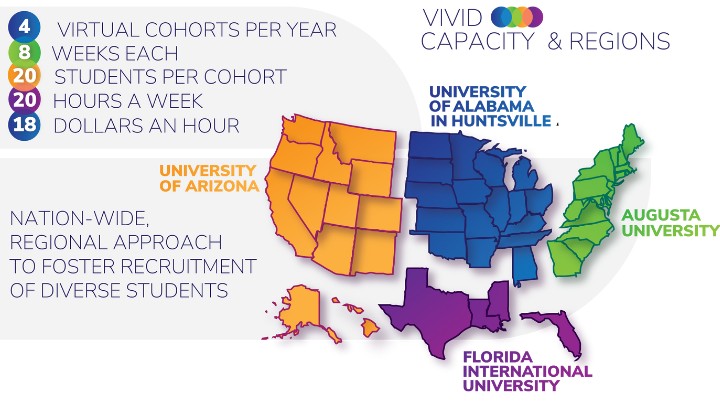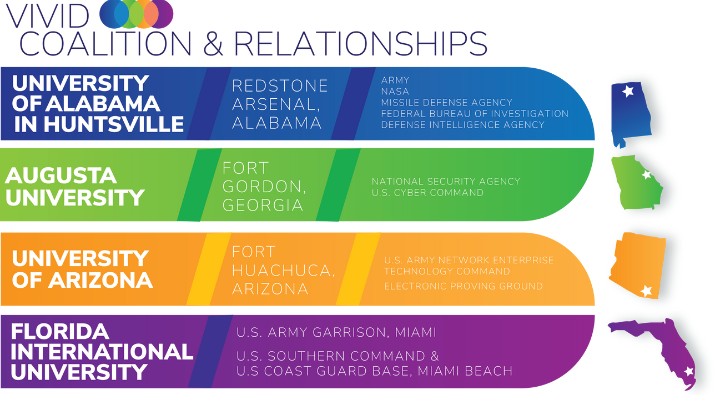The University of Alabama in Huntsville (UAH) is leading a four-university coalition to advance cybersecurity education through Virtual Internship and Varied Innovative Demonstrations (VIVID). This three-year program is funded by a $3.2 million grant from the Department of Defense (DOD). UAH is a part of The University of Alabama System.
UAH’s nationwide coalition includes Augusta University in Georgia, Florida International University and The University of Arizona.

VIVID is a three-year nationwide, regional approach to foster recruitment of diverse students. Each year it will offer four virtual cohorts of eight weeks each with 20 students per cohort. Participating students will work 20 hours a week at a rate of $18 per hour.
Courtesy VIVID Coalition
Dr. Tommy Morris, director of the UAH Center for Cybersecurity Research and Education (CCRE) is principal investigator for the coalition. Co-principal investigators are Sharon Johnson, UAH; Dr. Josh Pauli, Arizona; Dr. Michael Nowatkowski, Augusta, and Randy Pestana, Florida.
“The VIVID program hires interns from Centers of Academic Excellence in Cybersecurity Education and Research to work side by side with experts from Redstone Arsenal, the associate’s Defense Industrial Base,” Morris said. “In doing so, this program provides a new vector for workforce development for North Alabama. The VIVID program also provides enhanced visibility for UAH and our three partners.”
The support of Alabama Lt. Gov. Will Ainsworth was instrumental in the development of the UAH CCRE.
“Huntsville is nationally recognized as a hub of cutting-edge technology and ground-breaking research, and much of that spotlight is focused on the UAH Center for Cybersecurity Research and Education, which I was proud to help create,” Ainsworth said. “In addition to developing the next generation of cybersecurity experts and innovating new techniques and technologies, this grant demonstrates that the center is also helping attract additional federal dollars, jobs and opportunities to our state.”
VIVID has three key objectives involving National Centers of Academic Excellence in Cybersecurity (NCAE-C):
- Provide an enhanced pipeline for diverse future cyber leaders through virtual paid internships to help students translate academic learning to cybersecurity practice and competency in a work role or job.
- Increase hands-on exposure to cybersecurity techniques by developing and conducting live Red versus Blue hackathon events developed by the VIVID coalition.
- Host the fall 2024 annual colloquium which will enhance the visibility and stature of leaders within the DOD cyber community by recognizing and communicating their programs’ successes and upcoming goals.

Members of the Virtual Internship and Varied Innovative Demonstrations (VIVID) coalition have strong relationships with Department of Defense agencies and military bases in their specific regions. (Fort Gordon in Georgia has been renamed Fort Eisenhower.)
Courtesy VIVID Coalition
UAH and each of its coalition partners are either R1 or R2 universities and possess a long history of supporting DOD and government programs. Each of the coalition members brings a unique relationship with DOD agencies and military bases in its specific region.
UAH, an R1 university, works closely with the Army, Missile Defense Agency, NASA, Federal Bureau of Investigation (FBI) and the Defense Intelligence Agency, Space and Missile Defense Command and Combat Capabilities Development Command (DEVCOM) at Redstone Arsenal.
Augusta University serves the National Security Agency and U.S. Cyber Command at Fort Eisenhower (formerly Fort Gordon) in Georgia.
Florida International serves the U.S. Army Garrison in Miami and the U.S. Southern Command and the U.S. Coast Guard Base in Miami Beach.
The University of Arizona serves the U.S. Army Network Enterprise Technology Command (NETCOM) and Electronic Proving Ground (EPG) at Fort Huachuca, Ariz.